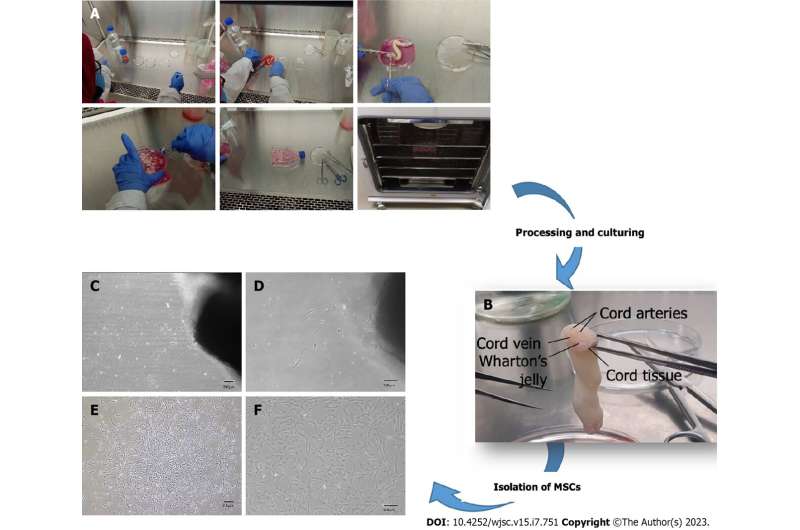Zinc enhances cell adhesion, migration, self-renewal potential of human umbilical cord-derived mesenchymal stem cells

Zinc (Zn) is the second most abundant trace element after Fe, present in the human body. It is frequently reported in association with cell growth and proliferation, and its deficiency is considered to be a major disease contributing factor.
A research team recently set out to determine the effect of Zn on in vitro growth and proliferation of human umbilical cord (hUC)-derived mesenchymal stem cells (MSCs).
The study is published in the World Journal of Stem Cells.
Within the research, hUC-MSCs were isolated from human umbilical cord tissue and characterized based on immunocytochemistry, immunophenotyping, and tri-lineage differentiation. The impact of Zn on cytotoxicity and proliferation was determined by MTT and Alamar blue assay. To determine the effect of Zn on population doubling time (PDT), hUC-MSCs were cultured in media with and without Zn for several passages.
An in vitro scratch assay was performed to analyze the effect of Zn on the wound healing and migration capability of hUC-MSCs. A cell adhesion assay was used to test the surface adhesiveness of hUC-MSCs. Transcriptional analysis of genes involved in the cell cycle, proliferation, migration, and self-renewal of hUC-MSCs was performed by quantitative real-time polymerase chain reaction. The protein expression of Lin28, a pluripotency marker, was analyzed by immunocytochemistry.
Zn at lower concentrations enhanced the rate of proliferation but at higher concentrations (> 100 µM), showed concentration dependent cytotoxicity in hUC-MSCs. hUC-MSCs treated with Zn exhibited a significantly greater healing and migration rate compared to untreated cells.
Zn also increased the cell adhesion rate, and colony forming efficiency (CFE). In addition, Zn upregulated the expression of genes involved in the cell cycle (CDC20, CDK1, CCNA2, CDCA2), proliferation (transforming growth factor β1, GDF5, hypoxia-inducible factor 1α), migration (CXCR4, VCAM1, VEGF-A), and self-renewal (OCT4, SOX2, NANOG) of hUC-MSCs. Expression of Lin28 protein was significantly increased in cells treated with Zn.
The research findings suggest that zinc enhances the proliferation rate of hUC-MSCs decreasing the PDT, and maintaining the CFE. Zn also enhances the cell adhesion, migration, and self-renewal of hUC-MSCs. These results highlight the essential role of Zn in cell growth and development.
More information:
Iqra Sahibdad et al, Zinc enhances the cell adhesion, migration, and self-renewal potential of human umbilical cord derived mesenchymal stem cells, World Journal of Stem Cells (2023). DOI: 10.4252/wjsc.v15.i7.751
Provided by
World Journal of Stem Cells
Citation:
Zinc enhances cell adhesion, migration, self-renewal potential of human umbilical cord-derived mesenchymal stem cells (2023, July 26)
retrieved 26 July 2023
from https://phys.org/news/2023-07-zinc-cell-adhesion-migration-self-renewal.html
This document is subject to copyright. Apart from any fair dealing for the purpose of private study or research, no
part may be reproduced without the written permission. The content is provided for information purposes only.
For all the latest Science News Click Here
For the latest news and updates, follow us on Google News.

